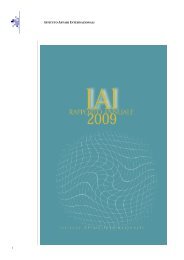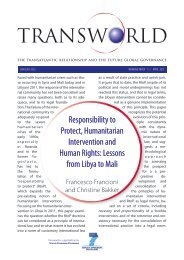Paper - IAI - Istituto Affari Internazionali
Paper - IAI - Istituto Affari Internazionali
Paper - IAI - Istituto Affari Internazionali
Create successful ePaper yourself
Turn your PDF publications into a flip-book with our unique Google optimized e-Paper software.
<strong>IAI</strong>0909<br />
Concluding remarks<br />
The Treaty of Friendship, Partnership and Cooperation between Italy and Libya marks<br />
the conclusion of long negotiations on diplomatic normalization between the two<br />
countries coinciding with the end of sanctions on Libya. Closer bilateral ties between<br />
Italy and Libya can boost Libya’s integration into the circuit of international<br />
cooperation at various levels.<br />
The colonial heritage has long conditioned Italo-Libyan relations, curbing their growth<br />
and periodically triggering tensions. Putting an end to the disputes related to Italian<br />
colonialism – with “costs” that are not negligible for Italy – the Treaty has contributed<br />
to creating a favorable climate for a major improvement in bilateral relations. In<br />
addition, the Treaty provides a new frame of reference for cooperation in many sectors.<br />
The economic sector is particularly promising since trade relations have always been<br />
important and Libyan investments in Italy have increased constantly in recent years. No<br />
less important is the part of the Treaty on the fight against illegal immigration, which<br />
calls for Libyan coastline patrol by mixed crews and land border satellite surveillance.<br />
As past experience proves, cooperation in this sector is difficult. According to some<br />
commentators, the approach envisaged in the Treaty would raise serious human rights<br />
concerns, in particular about the fate of immigrants turned back.<br />
In general, the provisions on Partnership of the Treaty are mainly programmatic. Some<br />
of the more complex commitments will have to be defined in more detail and the<br />
transition to their implementation will not be easy. In the past, various bilateral<br />
agreements have remained dead letter. Much will depend on the internal dynamics of<br />
the Libyan regime and the evolution of its regional policies and its relations with other<br />
international actors. Italy will in any case, thanks also to this new Treaty, be able to<br />
make an important contribution to the consolidation that has opened the door to new<br />
relations between Libya and the West.<br />
© <strong>Istituto</strong> <strong>Affari</strong> <strong>Internazionali</strong><br />
8
















